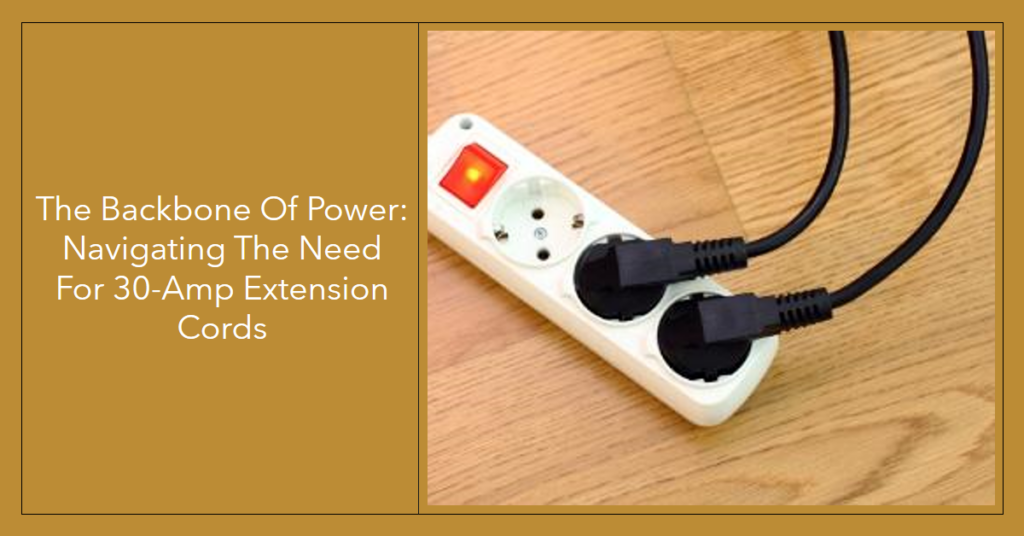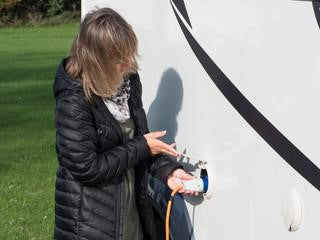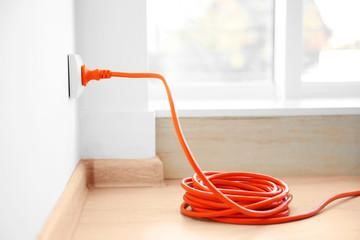

The Backbone of Power: Navigating the Need for 30-Amp Extension Cords

30-amp extension cords are probably the last thing that comes to mind when shopping for electrical cables. That’s due to their specialized and rather limited range of applications.
But the fact that we don’t interact so frequently with 30-amp power extenders doesn’t make them any less valuable. In fact, these cables get far less credit than they deserve.
That’s why we’ve put together this definitive guide to 30-amp extension cables. Read on for everything you need to know before you go shopping for some of the most efficient electrical cords.
What Is A 30-Amp Extension Cord?

A 30-amp extension cord is a power cable rated for 30 amperes.
Amps, volts, and watts are three common measurement units used in electrical parlance.
Amps determine the rate at which electrons flow through a given point in an electrical conductor. Volts measure the force pushing electrons as they flow through an electrical circuit, while watts denote the energy an electrical current can generate.
The three units of measurement share a relationship in which Amps x Volts = Watts.
Now, a 30 amp extension cord is rated for higher amperage, voltage, and wattage than, say, 20-amp and 15-amp cables. That equally makes it the better option for connecting power-hungry electrical appliances and equipment.
How Much Power Can A 30-Amp Extension Cord Produce?
The word “power” concerning electrical cords denotes wattage. Most 30-amp extension cords are rated for 120 volts.
Going by the formula A X V = W, these cables can provide up to 3,600 watts of power. That’s considerably more power than you get with regular household or office cables.
Common Applications Of 30-amp Extension Cords
30-amp extension cords are typically used for charging recreational vehicles (RVs). That says a lot about their current handling abilities.
You can also use 30-amp power extenders with any appliance or machinery that requires more power than your regular cables can handle.
One safety precaution while using 30-amp extension cords is to match them up with 30-amp outlets. Plugging the cable into a receptacle rated for lower amperage could cause an explosion at the entry point.
It’s also worth noting that the electrical system for most RVs supports 30-amp or 50-amps. Smaller RVs are typically rated for 30 amps, while larger counterparts can support up to 50 amps. Remember to charge the vehicle with an extension cord matched to its amperage requirements.
Now, it may be difficult to determine an RV’s total amperage rating if you purchased a refurbished or remodeled vehicle. That’s especially if the modifications entailed replacing older electrical components with new ones. In that case, your best bet would be to find an extension cord with an amperage rating higher than the highest-rated appliance in the RV.

Factors Affecting the Performance Of 30-amp Extension Cords
1. Wire Length
30-amp extension cords come in different sizes, ranging from 5 feet to 100 feet. Determining how long a 30-amp extension cord should be depends on the distance between an electrical appliance and the nearest power outlet.
However, remember that electrical resistance increases with cable length. This can cause a voltage drop, reducing a wire’s ability to power all connected appliances.
2. Cable Gauge
The gauge or thickness of a 30-amp extension cord determines its reliability, especially when used with power-demanding appliances.
The good news is that many outlets rated for 30 amps require a 10 gauge extension cord. 10 AWG cables will unlikely melt even if plugged into higher-amp receptacles.
For comparison, a standard 20 amp extension cord is rated for 12 AWG, while 15-amp cables work best with 14-gauge wires.
Plugging a 12- or 14-gauge extension cord into a 30-amp outlet can cause a voltage drop. Worse yet, the cable could heat up and melt, potentially damaging your priceless appliances or endangering your safety.

Frequently Asked Questions about 30-amp Extension Cords
1. Can you use 30-amp extension cords with 12-gauge wires?
A 12 gauge extension cord is resilient enough to power several heavy-duty electrical equipment.
However, 10 AWG is the recommended gauge rating for 30-amp cables. Anything lower could cause a voltage drop, reducing the number of appliances you can connect simultaneously.
2. What’s the difference between a 30-amp extension cord and a 220 extension cord?
The “30” reference in 30-amp extension cords denotes amperage rating, whereas the “220” reference in 220 cables represents voltage.
Remember that most 30-amp extension cords are rated for 120 volts. Therefore, a 220 extension cord might deliver the same amount of power, provided the cable comes in the right gauge.
3. What’s the difference between 30-amp extension cords and 10/3 extension cords?
Both 30-amp and 10/3 extension cords are heavy-duty cables that let you connect power-hungry equipment. The digits “10” and “3” in a 10/3 extension cord stand for gauge and number of wires, respectively.
10/3 extension cords are 10-gauge cables with three wires, with the third wire as ground.
Although 30-amp extension cords and 10/3 cables share the same gauge rating, the latter option is typically used with appliances that draw between 10 and 15 amps.

Final Word
30-amp extension cords are invaluable for homes and workplaces that rely on heavy-duty appliances. The higher amperage rating makes these wires especially suitable for charging RVs and similar equipment.
Due to their efficiency, 30-amp power extenders tend to be considerably expensive. One way to save on your next purchase is to buy a bulk extension cord wire.
